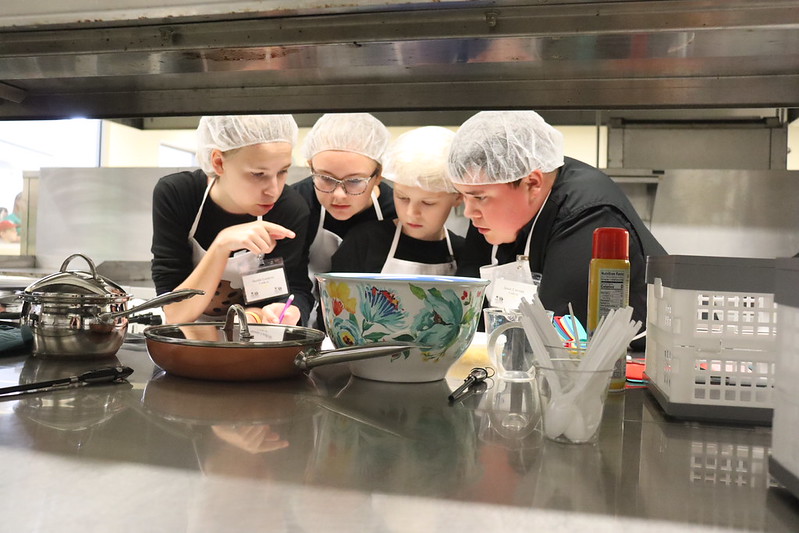By Rebekah Hall
U of A System Division of Agriculture
Article submitted
LITTLE ROCK — To help young people build confidence in the kitchen, Arkansas 4-H will host a Virtual Culinary Camp from Nov. 7-9 via Zoom. The camp is intended for children ages 5-19, and the camp is open to the public at no cost.
Participants will make several dishes, sauces and other meal components during the camp’s three sessions, with an emphasis on making each element from scratch.
“I believe making the meals completely from scratch encourages campers to think outside the box,” said Creena Bocksnick, Arkansas 4-H camping coordinator for the University of Arkansas System Division of Agriculture and leader of the culinary camp. “They can use different parts of a dish and mix and match with boxed or canned ingredients in the future, helping them create a healthier meal than they might have if using all processed ingredients.
“For example, we have made pasta during several camps in the past,” Bocksnick said. “We make the noodles from scratch, as well as the sauce. I think it just gives them options and working knowledge of how to put individual ingredients together to create something.”
The registration deadline is Oct. 24. Arkansas 4-H members can register through their ZSuite Profile, the enrollment platform used by 4-H. Children who are not 4-H members can register at 4h.zsuite.org/external-event-registration/41712.
The first session will take place in the evening on Nov. 7. On Nov. 8, the camp will be split into a morning block and an afternoon block. The last session on Nov. 9 will take place in the afternoon.
For younger campers, parents or guardians are required to participate if the child needs supervision in the kitchen.
“Typically, we have several families register to participate together,” Bocksnick said. “We also have a few 4-H clubs that participate as a group in their meeting space.”
Bocksnick said that during the registration process, campers are asked what dishes and skills they would like to learn, and that she makes the camp schedule around those requests. In years past, attendees have made pumpkin snickerdoodle cookies, hamburgers — with buns and patties made from scratch — chicken noodle soup, granola bars, stir fry, macarons and more.
“I think this camp helps participants see that cooking is not as hard as it seems,” Bocksnick said. “Some dishes that may seem difficult or scary aren’t, when you break it down. And if something doesn’t go according to plan, it isn’t the end of the world. They also have the freedom to be creative and adjust to their tastes. They don’t have to follow a recipe to the T.”
Practicing culinary skills
The Arkansas 4-H Culinary Camp began as a cake decorating camp in 2018 and switched to a virtual baking and decorating camp in 2020 during the COVID-19 pandemic. Starting in 2021, virtual attendees cooked three full meals over the course of the annual camp, along with other snacks, drinks, spice mixes and baked goods.
“We typically work on skills and techniques as we go,” Bocksnick said. “I work through the process and demonstrate, and I answer questions and help troubleshoot through the recipes. I don’t have the expectation for kids to have a lot of past cooking experience, but we encourage them to do as much as they are able. I take my time, and we move at whatever pace we need to.”
Bocksnick said that though parents are involved for many of the participants, it’s helpful for campers to receive guidance from her, rather than just a parent.
“Cooking is one of those things where if a parent tries to give their kid instructions, it doesn’t always go over well,” Bocksnick said. “This gives them an opportunity to learn from someone else. It is also a good way for families to spend time together trying new things and learning how to use tools that they have.
“It allows families to work together towards a common goal, hopefully encouraging the kids to become part of the process of family meals,” Bocksnick said. “There are also some dishes that I get them started on, and it’s up to the family to wrap them up.”
The Virtual Culinary Camp is open to the public. Bocksnick said it’s important to have “opportunities open to anyone.”
“These are skills that anyone can use,” she said. “It also helps expose more people to 4-H. We typically don’t have a lot of non-members who join, usually just a few, but it also gives kids an opportunity to invite their friends. The hope is that they will become members afterward.”
Bocksnick said she encourages children and families to register, as past participants “really enjoy it.”
“Because I open it up for requests, we do things that some of the parents may or may not have done,” Bocksnick said. “I regularly get messages when people reuse recipes we’ve made. One family uses it as a mother-son activity, and they have been putting together a cookbook of the recipes they completed during the camp.”
For more information about the Virtual Culinary Camp, contact Creena Bocksnick at cbocksnick@uada.edu. For more information about Arkansas 4-H Healthy Living projects, visit 4h.uada.edu/programs/healthy-living/.
To learn about extension programs in Arkansas, contact your local Cooperative Extension Service agent or visit www.uaex.uada.edu. Follow us on X and Instagram at @AR_Extension. To learn more about Division of Agriculture research, visit the Arkansas Agricultural Experiment Station website: https://aaes.uada.edu. Follow on X at @ArkAgResearch. To learn more about the Division of Agriculture, visit https://uada.edu/. Follow us on X at @AgInArk.
About the Division of Agriculture
The University of Arkansas System Division of Agriculture’s mission is to strengthen agriculture, communities, and families by connecting trusted research to the adoption of best practices. Through the Agricultural Experiment Station and the Cooperative Extension Service, the Division of Agriculture conducts research and extension work within the nation’s historic land grant education system.
The Division of Agriculture is one of 20 entities within the University of Arkansas System. It has offices in all 75 counties in Arkansas and faculty on three campuses.
Pursuant to 7 CFR § 15.3, the University of Arkansas System Division of Agriculture offers all its Extension and Research programs and services (including employment) without regard to race, color, sex, national origin, religion, age, disability, marital or veteran status, genetic information, sexual preference, pregnancy or any other legally protected status, and is an equal opportunity institution.






